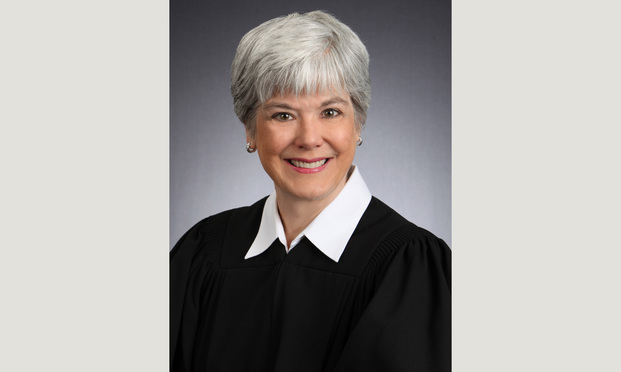Pa. High Court Eyes Validity of Noncompetes Signed After Employment Begins
Alan Frank, whose client is a Pennsylvania company that provides telecommunications construction services, told the justices there is no case law specifically stating that restrictive covenants must be executed before the parties begin working together.
March 11, 2020 at 03:38 PM
4 minute read
 Pennsylvania Superior Court Judge Judith Olson.
Pennsylvania Superior Court Judge Judith Olson.
An attorney representing a telecom construction company asked the Pennsylvania Supreme Court on Wednesday to adopt a rule saying that restrictive covenants are enforceable regardless of when they are signed, as long as both parties are aware of the employer's intentions before the employee begins working.
Attorney Alan Frank of Frank Law Associates in Jenkintown, Pennsylvania, made that argument to the justices in Rullex Co. v. Tel-Stream in an effort to have the court enforce a restrictive covenant agreement his client, Rullex Co. LLC, officially entered into with the defendant after the two companies began working together. The case is significant because it may give the high court an opportunity to clarify whether agreements that might be in negotiations at the start of an employment arrangement can contain enforceable restrictive covenants even though the document was not signed until after the work starts.
Frank, whose client is a Pennsylvania company that provides telecommunications construction services, told the justices there is no case law specifically stating that restrictive covenants must be executed before the parties begin working together.
"As long as the employee is aware of the intentions of the restrictive covenant walking in the door, so he's not being tricked" then the restrictive covenant signed later should be enforceable, Frank said. "The moment of the physical execution is irrelevant."
Frank's argument, however, appears to contradict a ruling of the Pennsylvania Superior Court, which determined in January 2019 that the agreement between Rullex and Tel-Stream, a company that provides labor crews to businesses that service cellular towers, was not enforceable since it had not been executed before the companies began working together.
"References to non-compete clauses found in unsigned draft agreements are not binding on the parties," Judge Judith Ference Olson wrote for a unanimous three-judge panel in a memorandum opinion. "Thus, since the written contract upon which appellant relies was executed after Tel-Stream commenced work, the trial court correctly determined that new and valuable consideration, beyond mere continued work, was needed to support the restrictive covenant. Appellant has not come forward with evidence of such new and valuable consideration beyond the original award of cellular tower work. Thus, appellant is unlikely to succeed based on any claim asserting an enforceable restrictive covenant."
Olson was joined by President Judge Jack Panella and Judge Maria McLaughlin.
According to court records, Rullex subcontracted work to defendant Tel-Stream. It is not in dispute that Tel-Stream signed a "subcontractor non-disclosure, non-solicitation, and developments agreement" with Rullex months after it actually began performing work for Rullex. The agreement barred Tel-Stream from competing with Rullex, soliciting Rullex's customers within a nonsolicitation region, and misappropriating Rullex's trade secrets.
In February 2018, Rullex sued Tel-Stream in the Philadelphia Court of Common Pleas alleging Tel-Stream breached the restrictive covenant by contracting with Rullex's main competitor, Invertice.
The trial court ruled in favor of Tel-Stream and its owner, defendant Yuri Karnei, and rejected Rullex's petition for injunctive relief, finding that the noncompete was invalid because it was signed after the first day of employment.
Rullex appealed to the Superior Court, arguing that the trial court improperly disregarded the fact that the noncompete agreement was drafted prior to the first day of employment, but the appeals panel upheld the ruling.
Before the justices Wednesday, Frank asked that the case be remanded back to the trial court for a factual determination about whether the agreement was enforceable.
Tel-Stream's attorney, Gary Green of Sidkoff, Pincus & Green, however, contended that there had not been any understanding between the parties that the employment agreement would include a restrictive covenant. According to Green, Karnei did not speak English, and the only testimony Rullex offered about the contract talks indicated the discussions ended with Rullex telling Karnei to have the agreement translated and vetted by a lawyer.
Green further told the justices he disagreed with the notion that the lower court's ruling stood for the proposition that all restrictive covenants must be executed before employment begins. Instead, he said the trial court focused its determination on whether there had been an enforceable agreement, and suggested that the case might not present the issue as cleanly as was indicated in the court's order granting allocatur.
"The essence is there was no agreement when he was sent out," Green said.
This content has been archived. It is available through our partners, LexisNexis® and Bloomberg Law.
To view this content, please continue to their sites.
Not a Lexis Subscriber?
Subscribe Now
Not a Bloomberg Law Subscriber?
Subscribe Now
NOT FOR REPRINT
© 2025 ALM Global, LLC, All Rights Reserved. Request academic re-use from www.copyright.com. All other uses, submit a request to [email protected]. For more information visit Asset & Logo Licensing.
You Might Like
View All
Phila. Judge Upholds $68.5M Verdict Over Construction Worker's Death
3 minute read
Delivery Driver's Slip-and-Fall Suit Slides Forward Against Equipment Rental Company
4 minute read
Pa. Construction Law Update: Best Practices Learned From 3 Recent Appellate Decisions

Troutman Pepper Accused of Inattentive Case Management in $59M Malpractice Suit
7 minute readTrending Stories
- 1South Florida Attorney Charged With Aggravated Battery After Incident in Prime Rib Line
- 2'A Death Sentence for TikTok'?: Litigators and Experts Weigh Impact of Potential Ban on Creators and Data Privacy
- 3Bribery Case Against Former Lt. Gov. Brian Benjamin Is Dropped
- 4‘Extremely Disturbing’: AI Firms Face Class Action by ‘Taskers’ Exposed to Traumatic Content
- 5State Appeals Court Revives BraunHagey Lawsuit Alleging $4.2M Unlawful Wire to China
Who Got The Work
J. Brugh Lower of Gibbons has entered an appearance for industrial equipment supplier Devco Corporation in a pending trademark infringement lawsuit. The suit, accusing the defendant of selling knock-off Graco products, was filed Dec. 18 in New Jersey District Court by Rivkin Radler on behalf of Graco Inc. and Graco Minnesota. The case, assigned to U.S. District Judge Zahid N. Quraishi, is 3:24-cv-11294, Graco Inc. et al v. Devco Corporation.
Who Got The Work
Rebecca Maller-Stein and Kent A. Yalowitz of Arnold & Porter Kaye Scholer have entered their appearances for Hanaco Venture Capital and its executives, Lior Prosor and David Frankel, in a pending securities lawsuit. The action, filed on Dec. 24 in New York Southern District Court by Zell, Aron & Co. on behalf of Goldeneye Advisors, accuses the defendants of negligently and fraudulently managing the plaintiff's $1 million investment. The case, assigned to U.S. District Judge Vernon S. Broderick, is 1:24-cv-09918, Goldeneye Advisors, LLC v. Hanaco Venture Capital, Ltd. et al.
Who Got The Work
Attorneys from A&O Shearman has stepped in as defense counsel for Toronto-Dominion Bank and other defendants in a pending securities class action. The suit, filed Dec. 11 in New York Southern District Court by Bleichmar Fonti & Auld, accuses the defendants of concealing the bank's 'pervasive' deficiencies in regards to its compliance with the Bank Secrecy Act and the quality of its anti-money laundering controls. The case, assigned to U.S. District Judge Arun Subramanian, is 1:24-cv-09445, Gonzalez v. The Toronto-Dominion Bank et al.
Who Got The Work
Crown Castle International, a Pennsylvania company providing shared communications infrastructure, has turned to Luke D. Wolf of Gordon Rees Scully Mansukhani to fend off a pending breach-of-contract lawsuit. The court action, filed Nov. 25 in Michigan Eastern District Court by Hooper Hathaway PC on behalf of The Town Residences LLC, accuses Crown Castle of failing to transfer approximately $30,000 in utility payments from T-Mobile in breach of a roof-top lease and assignment agreement. The case, assigned to U.S. District Judge Susan K. Declercq, is 2:24-cv-13131, The Town Residences LLC v. T-Mobile US, Inc. et al.
Who Got The Work
Wilfred P. Coronato and Daniel M. Schwartz of McCarter & English have stepped in as defense counsel to Electrolux Home Products Inc. in a pending product liability lawsuit. The court action, filed Nov. 26 in New York Eastern District Court by Poulos Lopiccolo PC and Nagel Rice LLP on behalf of David Stern, alleges that the defendant's refrigerators’ drawers and shelving repeatedly break and fall apart within months after purchase. The case, assigned to U.S. District Judge Joan M. Azrack, is 2:24-cv-08204, Stern v. Electrolux Home Products, Inc.
Featured Firms
Law Offices of Gary Martin Hays & Associates, P.C.
(470) 294-1674
Law Offices of Mark E. Salomone
(857) 444-6468
Smith & Hassler
(713) 739-1250





